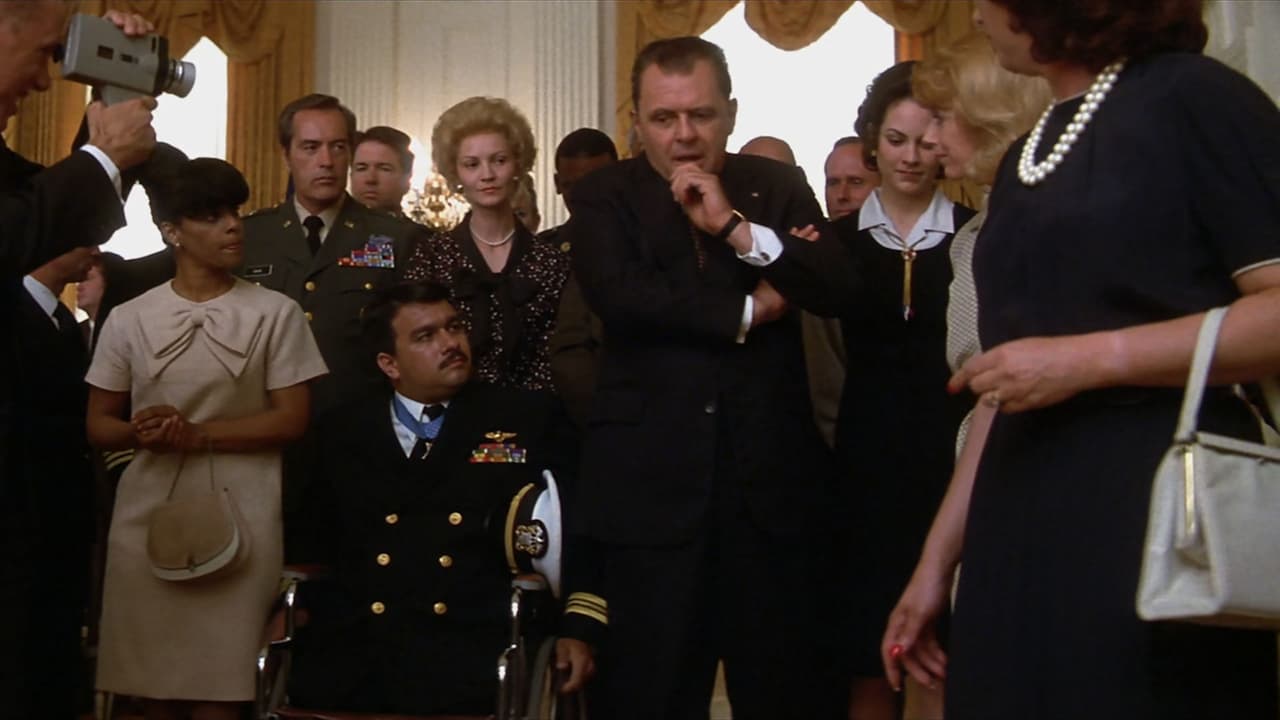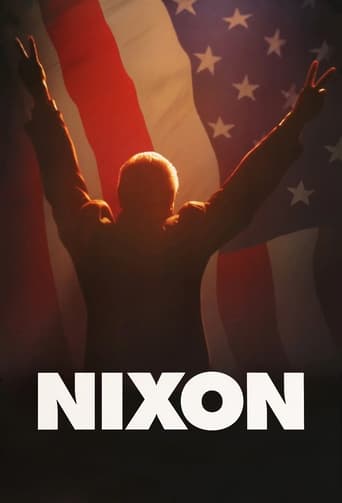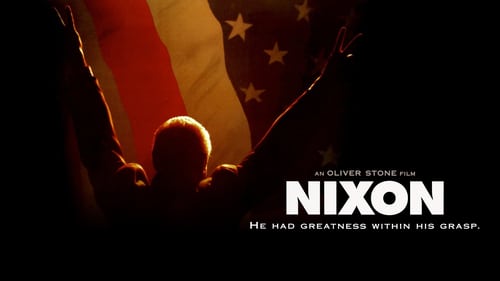



Let's be realistic.
The movie's not perfect, but it sticks the landing of its message. It was engaging - thrilling at times - and I personally thought it was a great time.
View MoreThis movie feels like it was made purely to piss off people who want good shows
View MoreThis is one of the best movies I’ve seen in a very long time. You have to go and see this on the big screen.
View MoreI know it's not very popular to criticize Oliver Stone, since he's created such revered masterpieces as Platoon and JFK, I have to say his judgement was seriously impaired when he cast Nixon. Anthony Hopkins? If I thought long and hard, I could probably come up with a worse choice, but right now I'm drawing a blank. Not only do Richard Nixon and Anthony Hopkins not share one molecule of a similar appearance, but everyone knows Anthony Hopkins can't do accents! If you're not going to look like Nixon, you've got to at least sound like him! Anthony Hopkins is a disaster. He was so terrible, I turned the film off. I couldn't listen to him utter "Bunny" one more time.To be fair, because I have no desire to be mean for no reason, Anthony Hopkins wasn't Oliver Stone's first choice. Reportedly, Tom Hanks, Jack Nicholson, Warren Beatty, and John Malkovich were offered the part first. Stone also considered Gary Oldman, Robin Williams, Tommy Lee Jones, and Gene Hackman before offering it to Anthony Hopkins. I'd like to think Stone wasn't really happy with Hopkins's performance, and I'd like to think it was his terrible imitation that made the movie a box-office flop, but there's no way to know for sure.I'm sure you don't need a warning, but card-carrying Republicans are going to want to avoid this movie. Oliver Stone is not conservative-friendly, and he doesn't even try to paint President Nixon in a positive light. In this three-hour-fifteen-minute biopic, he includes memories from Nixon's childhood up through and past the Watergate scandal. All the famous names that one would expect to be in a Watergate movie are included: Joan Allen as Pat Nixon, David Hyde Pierce as John Dean, Bob Hoskins as J. Edgar Hoover, Paul Sorvino as Henry Kissinger, J.T. Walsh as John Ehrlichman, James Woods as H.R. Haldeman, and Sam Waterston as Richard Helms.In the greatest of ironies, Dan Hedaya, the man who played the ultimate Nixon in Dick, has a small role in the film, as does Saul Rubinek, who played a fantastic Henry Kissinger. Apparently, everybody wanted to be in this movie, for reasons I can't fathom. It's an atrocity, and anyone who watches it as a history lesson on President Nixon will be very poorly educated. But, Ed Harris, Powers Boothe, Mary Steenburgen, E.G. Marshall, David Paymer, Annabeth Gish, Tony Goldwyn, Larry Hagman, Edward Herrmann, Madeline Kahn, Robert Beltran, John C. McGinley, Michael Chiklis, and Marley Shelton didn't think it was a mistake to act in the film. While it was nominated for four Academy Awards in 1996, I can't recommend watching it even to see how atrocious it was. Take my word for it, please.
View MoreMaybe overall the film wasn't that bad but many times the 'plot' descended into the pits/depths of poor cinema. Oliver Stone, if his intent was to portray former President Nixon in a sensitive even sympathetic light, the final cut didn't attest to that fine sentiment.Yeah, there were some poignant scenes that sort of cast the brooding politician often photographed with a permanent five-o'clock shadow in a cleaner, shinier light. For example... President Nixon's encounter with some student protesters at the Linclon Memorial comes to mind: especially the exchange with the 19 year old female. Her assertion pierced Nixon deep. I paraphrase:"So, you're powerless."Nixon's response though was mere fodder for the next volley."No... Change takes time. I am able to control the 'system' some of the time."The girl pounced on that one."Sounds like a wild animal."Really, that's about the only scene where Stone cut President Nixon some 'slack.Then there's the drinking bouts. In this film, everyone drank and drank like there was no tomorrow, no presidency. Only occasionally and for mere seconds did any of the cast stop to eat/breathe/despair. By my count, Mr. President had 60 double whiskeys in a little over two hours. Now if you mix in the champagne cocktails and Texas chili dogs, Dick, was well over the legal limit for breathalizing with civility.The good...Anthony Hopkins, in his portrayal of 'Treeky Dick' gave a good account of himself but maybe not that of the real man. The supporting cast were just that. No one member stood out or forward as outstanding. And there were plenty of moments where some subordinate should have grabbed the baton and done something, anything useful. For sure, Stone didn't coach them in any strong direction. Too much ad-liberalism...The bad...Why mention Howard Hunt and then not follow up on the foreshadowing? Better yet, why cast Ed Harris as the mystery man if in the film he was relegated to holding the bag-man? Makes no sense but helps the plot meander...The ugly...If you're going to be kind, Oliver, please cut the cursing. Even Bob, scuza me, J. Edgar Hoover said as much. Yes, presidents who occasionally curse are no less presidential. Seems to me though that Stone wanted to cast a crooked, accusatory finger at Nixon even while the latter gazed affectionately at the larger than life portrait of the famous and much beloved Civil War president, Lincoln.That's a bit unkind.OK, Nixon paid his vows (when the camera was on him) to IKe's portrait as well but no homage what-so-ever to John's. And whenever the besieged President Nixon encountered the real white house ghost, Dick followed the script but not before he poured a drink. Then he punted.Summation...Oliver's film shed little if any new light on who Mr. Richard Milhouse Nixon really was. To wit, Stone's rendition is a mere whitewash of what he could/should have done for the disgraced former President: tell the truth. In that regard, this film didn't even probe the surfaces.I'm more befuddled than ever. My guess: so is the surviving Nixon family. They and Richard Nixon deserved better. Hope history is as kind to the man as Henry Kissinger portended.
View MoreNixon was a great movie. Hands down. Oliver Stone really was able to paint a picture of a real man. A man with his demons, ambition, love, anger and power. It really was quite something to see such a masterpiece on a DVD. I would highly recommend this movie to anyone who enjoys learning about American History and human beings, as the American president, Dick Nixon was an exceptional human being. I can see how he got tangled in everything. I can see how he got in over his head without even knowing it. It was like watching someone swim out to sea and not having enough energy to swim back (an idea from the movie "Gattaca" 1997).Nixon, as a person, was really quite an intriguing man. I loved the way Oliver Stone was able to capture human weaknesses, such as emotional flashbacks, hallucinations and the feeling of human pain. The combination of Oliver Stones' directing combined with Anthony Hopkins' extra-ordinary acting ability really brought up the best of describing who President Nixon was.I liked how this movie focused on the president instead of the Watergate Affair. It really gave an accurate account of the turns of power, the politics and the complicated systems the president of The United States of America has to abide by in order to retain his high position of power.
View MoreI want to preface this by saying I'm not lambasting the film for any grievance with the portrayal one way or the other. It is an ordinary portrait of Nixon all told, as has been rehabilitated into public consciousness: a broken man who could achieve anything except the one thing he wanted to, to be loved and whole. His plight is ordinary in the sense that it is deeply human, this is how we have retrogradely dramatized Nixon in order to be able to understand his actions. His downfall, also human: the desire to cling to the controls of a life that is far beyond our scope or any four-year presidential term. The machinery or system keeps grinding out a narrative and we have only a small window to effect any change at all.So we unravel from Watergate, where all control was lost from too much desire for it. We piece Nixon's image in a reverse Kane style; from inside, together with this man looking for himself.If I am lambasting the film, it's for how much it grew out of hand as a film. It is very much Stone doing Nixon; feverish ramblings from personal darkness, powerful but manipulative rhetorics. Shamelessly emotional when it serves a purpose. We're spared nothing in the cinematic onslaught of different footage, dutch angles, slow-motion, light flares, incessant cuts and counter-cuts. No symbolism is too hamfisted: blood oozing from a steak as use of nuclear weapons is contemplated, superimpositions of Nixon's face on Mao's as the analogy is being forced, a gigantic Nixon looking pensive superimposed on the skies the day before Dallas. I believe Stone took on Natural Born Killers solely as a test run for the madness of this. Of course that film was a deliberate mess, pitched as hysterical satire. This is hysterically assembled, helter skelter.On the part of Stone, my view is that control was lost from the desire to be America's objective chronicler. In the early stages I believe the film was intended to be one long reverie and internal monologue triggered by the Watergate tapes. No doubt Stone was familiar with Robert Altman's film on Nixon and understood the project to be fundamentally visual. The idea was that we would visit, from this room where an old weary man is listening to his own voice, different stops in a long life in and out of the public eye, looking from both ends, looking for a narrative and who controlled the telling. In lieu with JFK, I believe part of the film was meant to be an unreliable, paranoid testimony shaped from memory. In lieu with JFK where the film was the trial that never happened, this would be the televised public apology that did. A confessional but one we could trust?But it grew out of hand, as did the man's ambitions.
View More